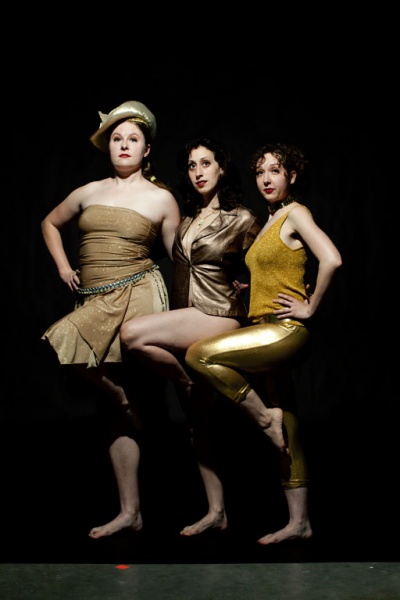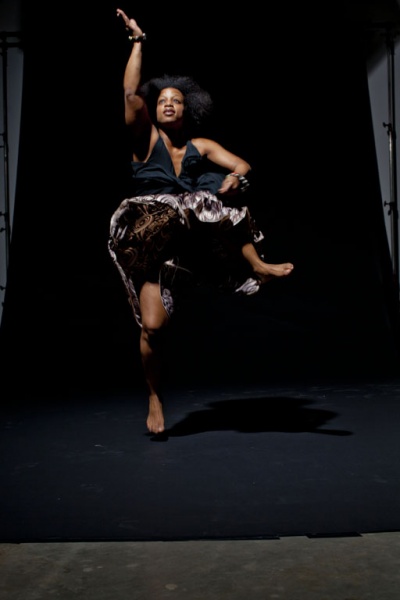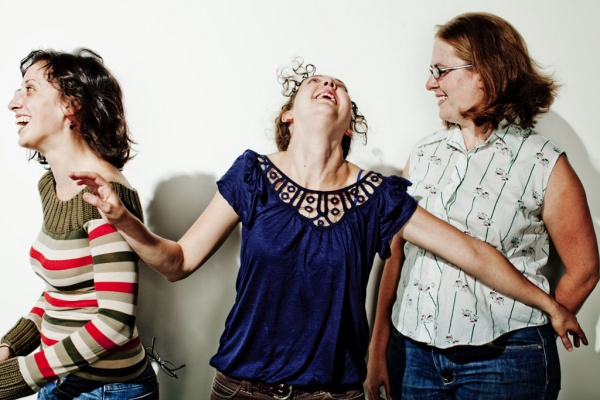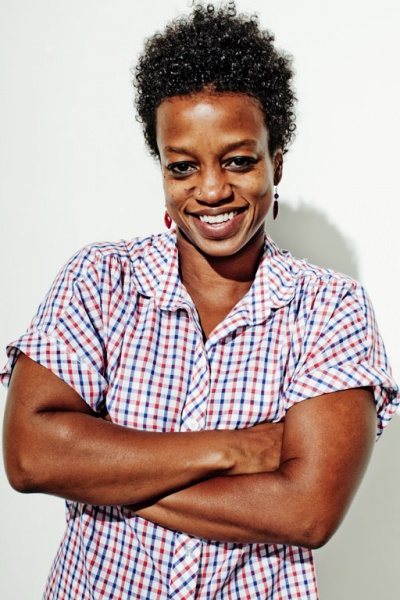MOMENTUM: Kenna Cottman and Mad King Thomas
Lightsey Darst reviews the second and final weekend of this year's MOMENTUM festival, co-presented by the Walker Art Center and the Southern Theater, with lively shows by Kenna Cottman (aka Kenna Sarge) and the madcap dancers of Mad King Thomas.




DANCE PARTY AT THE SOUTHERN! Momentum’s second weekend felt unmistakably festive as Kenna-Camara Cottman and Mad King Thomas (Theresa Madaus, Tara King, and Monica Thomas) packed the house with their fans. Fans is the word, too — not dispassionate viewers settling down to assess the evening’s premieres, but enthusiasts eager to laugh, clap, stomp, or shout at the high-energy dance or hijinks they know their favorites deliver. And deliver they did. But these weren’t just straight-up dance parties: they were dance parties with a difference — with a mirror.
Cottman starts her Shared Language in rehearsal mode: dancers and musicians greeting each other and setting up on stage while she comes down through the audience, talking on her cell phone to someone who can’t find his way to the Southern (“You’re where? At the University of Minnesota? Washington Avenue!”). But as the performers mishear and ignore each other, the rehearsal turns into a fight, then the fight into a ritual as their attacks and replies become call-and-response, which then sets the rhythm for a dance break. Cottman plays with levels of performance throughout the piece, constantly tugging at your sense of what’s happening. Performers backchat among themselves and to the audience, eat fruit, and wander about as if they’re not sure what comes next. They braid each other’s hair and make tea, pouring the tea from one tiny cup to another in a two-foot stream — a performance in itself. They speak one language and then another, then don’t seem to understand the language they were just speaking.
Dances interrupt the casual atmosphere: sometimes they’re choreographed and frontal, and sometimes the dancers trade solos, facing the drummers. Sometimes the dance is straight up African, sometimes it’s a hip hop/African mix, sometimes it’s Afro-modern. Sometimes the drummers dance. Some of the audience is seated onstage, at little café tables, suggesting a different sort of performance than what the rest of us (in risers) experience. At one point, a dancer complains to Cottman that another dancer made her laugh. At another, an audience member gets up to take a solo. Halfway through, guys in African garb come down through the audience, chatting, and join the action. And just as the performance never exactly begins, it never really ends either. A girl from the next piece wheels her bike upstage in a very Jacques Tati moment; someone has to tell the last drummer to pick up and leave the stage.
All this complicates the status of the seemingly key moment when Cottman and her dancers turn to the audience and intone words that are also printed in the program: “Look, I’m trying to tell America something. We are Africans. Don’t ask us to forget who we are and don’t tell me what to remember. I remember Africa. Somewhere way back there…” Is this real performance or “performance” — part of the unperformed work that’s intermittently rehearsed here? Perhaps there’s a clue in the fact that Cottman and her dancers face the house, ignoring the actual audience set-up — but, given that those café tables, as far as I can tell, are occupied by performers from the next piece, what would this clue mean? If I suggest that Cottman’s postmodern layering puts this statement in quotation marks, am I telling her what to forget?d
What’s clear is that this declaration works differently than most of the performance, which is concerned not with content, but method — not with what but how. And what an intoxicating how it is, charged with energy and humor, grounded in a characteristically African and African-American sense of play. Take the moment when one drummer steals pats on another’s drum — a bit of mischief that’s cooperative (the one has to look out for the other’s hand) and performative (lights cast their hands in long shadows against the wall).
Or take the dance. I love the form I was raised in, ballet, but I wish tradition and innovation could share the stage there as easily as they do here. I get that balance and shape have their own crystalline beauty, but for today I want to live in fire or water’s flame or flow the way Cottman’s dancers do. You don’t have to be a dancer to love the way everyone gets a solo to show what they do best: this one’s calligraphic arms, this one’s snake hips and silken relation to the floor, this one’s motor booty. And you definitely don’t have to be a dancer to love how Cottman herself moves: rubber-jointed and tireless, she treats gravity like another friend to play with. Finally, one more thing to love: how everyone gets to join in the dance party here. When a man in striped pants steps out for a quick Charleston, his stripes accentuating the wobbly movement, everyone eggs him on. Shared Language offers a model for interaction, a way of moving through this world that we might do well to emulate.
I love the form I was raised in, ballet, but I wish tradition and innovation could share the stage there as easily as they do here.
WITH ALL SPARKLES, NO HEART, MAD KING THOMAS stages an entirely different kind of party: a Prohibition-era gams-and-glitter fest with Harlow-headed temptresses, a gold-clad chorus line, more fur than a saber-toothed tiger, orgasmic voiceovers, hysterical giggling, and, of course, politics. MKT’s totally tasteless aesthetic (at one point, the three women moon the audience while intoning “have no sense of decency”) means you get to have your cake and eat it too. You get the femmes (gold pasties, check) and the feminism. In fact, the entire show might spring from this joke of the topless suffragette: the chorus line comes sashaying out one at a time, fashion show style, holding over their bare chests cardboard placards that make various third wave-ish points — i.e., three placards in a row with images of big, bigger, and ginormous boobs; one with milk jugs glued on, one with udders; one that says “signifier,” the next “signified”; a series with various political slogans, culminating in anarchy signs.
MKT has a lot to go on here. Consider how feminism is currently uncool while retro ads with busty ladies are hot, how “empowerment” has come to mean shopping and stripping, how we are somehow still fighting many of the same dreary battles (about leadership, daycare, domestic abuse) — and you might find yourself composing skits in which topless chicks shimmy to keep your attention while they recite (yawn!) early feminist speeches.
That skit suggests an overall problem with All Sparkles, No Heart, though: really making the point they’re after requires boring the audience a little, reciting the whole damn paragraph. I hate to say it (and I hope MKT will continue to take up the implied challenge), but maybe you can’t actually have and eat this particular angry post-feminist cake. For me, the basic joke doesn’t resolve or evolve: that is, the whole isn’t more than the sum of its parts — although I really wanted it to be. One example: the row of bikes at the back of the stage and the delicious chorus line made me expect a Busby Berkeley biketacular for the finale. Okay, so the actual ending, in which the chorus spins until they fall down exhausted while the principals preside, wicked goddesses with bare chests, fur skirts, and platinum tresses, makes me think of Barbarella’s orgasmatron and the bomb (or, specifically, how Oppenheimer quoted the Bhagavad Gita in reference to the bomb: “Now I am become death, the destroyer of worlds”) — but I wanted something more.
Still, at its best, this show has the audience screeching with cathartic glee. The chorus, clad in glad-bag couture, vamp up a storm while hacking and coughing like lifelong smokers. Beauty pageant contestants surrounded by admiring haloes of hands dreamily mix up their answers: “save the pieces of worlds!” “save the whales for the children!”
Like Cottman, MKT winds up side-stepping their subject and offering not an answer but a method. Their method is quite different than hers: ridicule, fearlessly exposing absurdity. But both show a faith in performance, in shared exploration and celebration as a way forward.
Noted performance details: The Momentum dance series, celebrating emerging choreographers, is presented by the Walker Art Center and the Southern Theater. The festival stages two weekends of dance performances, from July 14-23, at the Southern in Minneapolis.